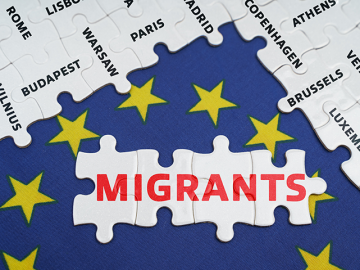FRA’s final migration bulletin identifies key trends, promising practices, emerging patterns, and persistent concerns from 2015 to March 2023. These include:
- EU external borders: while the EU opened its borders to people fleeing Ukraine, elsewhere people continue to die coming to the EU. Allegations of mistreatment, migrants being turned back, and civil society intimidation persist.
- Access to asylum: accessing temporary protection for people fleeing Ukraine was relatively easy. However, many asylum seekers continue to face legal and practical obstacles even though procedures are shorter. Examples include difficulties getting legal and language support. In addition, it is harder for people arriving irregularly to apply for asylum.
- Living conditions: Member States improved conditions in some reception and detention centres, but overcrowding remains a problem, especially for vulnerable people like children and victims of violence.
- Migrant children: guardianship for unaccompanied children and age assessments improved. Despite progress, many children still face detention or struggle to access education. Children also continue to go missing.
- Integration: although EU laws are stronger challenges remain. These include administrative and family reunification barriers, hate and discrimination towards migrants, and a lack of long-term solutions, like granting EU residence.
- Immigration detention: despite robust EU legal standards, issues persist. Detainees do not always get the information they need. Specialist facilities for children for example are lacking. Alternatives to detention are underused.
- Return procedures: monitoring returns is better but safeguards throughout the return process are not properly used. For example, assessments of whether people risk harm if returned are not fully carried out.
FRA began publishing its migration bulletins in September 2015. This final bulletin of fundamental rights concerns and improvements looks at the fundamental rights situation from 2015 to March 2023 across all EU countries.
